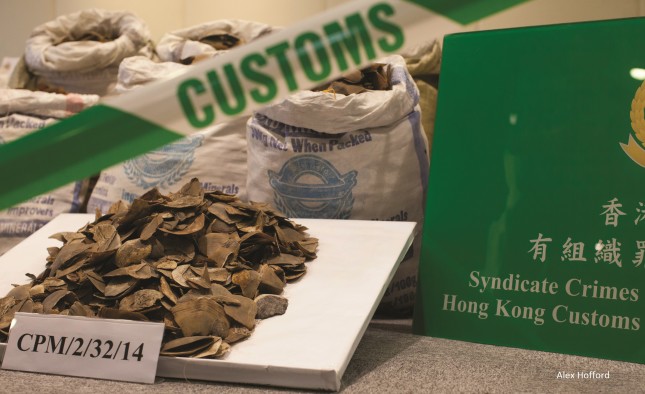-
We Must Address Exotic Wildlife Consumption to Avoid the Next Global Pandemic

A suspect in the transmission of Covid-19 to humans, pangolins are the most trafficked animal in the world despite the ban on trade by the Convention on International Trade in Endangered Species of Wild Flora and Fauna (CITES). Currently on the Red List of the International Union for Conservation of Nature (IUCN), pangolins are armadillo-looking mammals found in Asia and Africa but are more closely related to cats and dogs. Humans hunt them for their scales used in traditional medicine and the fashion industry and for their meat, which is considered a delicacy. Asian pangolins have become critically endangered, and poachers have turned to trafficking African species, most destined for China and Vietnam. According to TRAFFIC, a leading non-governmental organization working on wildlife trade, twenty tons of pangolins are trafficked each year, putting them on the fast track to extinction.
Scientists presume that the deadly coronavirus that has infected over 1.25 million people (as of April 5) and halted economic and social activity across the world may have jumped from an animal host, likely a pangolin or a bat, into humans and evolved to a pathogenic state. Although this transmission channel has not been confirmed with confidence, it has not been dismissed.
The suspected source of the outbreak is a “wet market” in Wuhan which also traded in illegal wildlife. Unsanitary, cramped, and weakly regulated, markets for illegal wildlife are breeding grounds where viruses likely mutate and cross into humans, though not all “wet markets” fit this description. The crossover of Covid-19 from animals to humans is not an isolated event—H1N1, SARS, and Ebola also originated in animals. Chinese authorities responded to the outbreak of Covid-19 by instituting an immediate ban on all domestic wildlife trade and consumption (February 24) and Vietnam followed. The risk, however, is that trade will move underground.
CITES listed pangolins as illegal to trade internationally in 2016. Since the convention’s creation in 1973, member states have adopted regulatory measures, passed legislation, and created institutions to regulate the international trade in endangered species. Billions have been spent on creating national parks, militarizing wildlife enforcement, and big-tech solutions. Yet, illegal wildlife trade continues to grow. According to the United Nations Office of Drugs and Crime (UNODC), wildlife and forest crime generates an estimated $19.5 billion annually in East Asia and the Pacific.
Overturning Assumptions to Address Demand for Wildlife Consumption
Renewed global focus on illegal trafficking in exotic animals is a natural result of the current pandemic, but policymakers will be making a mistake if they limit their response to tightening enforcement of wildlife trade bans. As long as there is demand, there will also be supply, and without sufficient regulation and efficient demand-reduction strategies, trade will be driven underground. A greater focus on reducing demand in end-user communities and improved understanding of the root causes of demand is critical.
Demand-reduction has generated interest, yet, as a recent study demonstrates, most campaigns have been ineffective because they mischaracterize wildlife consumers, primarily targeting a false, all-encompassing archetype of the “Asian Super Consumer.” A more grounded, culturally informed approach to understanding wildlife consumers will enable more targeted and effective education, marketing, and advertising campaigns that address the root causes of consumption. For example, as marketing professionals know all too well, it is imperative to understand the perceived value of the product and motivations for consuming it for any campaign to be effective.
Wildlife consumer preferences are most often determined by gender, and motivations are driven by the purpose and perceived value of the product, which in many cases revolve around beliefs passed down through generations. In Asia, many women, for example, consume pangolin scales because they think it will improve lactation, while many men are reported to consume pangolin meat for increased virility (interviews performed by author in Vietnam, 2019). Moreover, consumption of rhino horn, tiger bone or penis wine, and shark fin is frequently driven by male virility. More generally, much of the world shares the belief that consuming wild meat is “manly.”
While the West blames wildlife consumption on Asia’s “weird appetite” for unconventional foods and traditional medicine, it is also responsible for driving up demand for wildlife products, which can be seen as a status symbol. For example, the United States was a major importer of pangolins, primarily used in making exotic leather products, such as cowboy boots. Elephant and giraffe skins are still legal to trade and are in high demand, made into high-end car interiors, shoes, trinkets, and even bible covers.
The current pandemic brings into focus the interconnectedness of species and the urgency of addressing illegal wildlife consumption. Addressing the root causes of consumption will be critical to diminish demand. Launching campaigns to unearth our consumption biases and patterns can mobilize joint action for public and planetary health. For example, CHANGE, a Vietnamese NGO, is helping to break the generational cycle by employing celebrities and health professionals to change the perceived value of pangolin consumption, including a campaign featuring Miss Universe Vietnam and the Head of Andrology of a hospital in Ho Chi Minh City. U.S. celebrities with influence in target markets could also be the voice for endangered species, sending a powerful signal and turning the tide on our own survival and that of our non-human relatives.
Candace Famiglietti is a doctoral student and Maria Ivanova is associate professor of global governance and director of the Center for Governance and Sustainability at the John W. McCormack Graduate School of Policy and Global Studies at the University of Massachusetts Boston.
Sources: Business Insider, CHANGE, CNN, Elsevier, the Guardian, International Affairs, National Geographic, Nature Medicine, NBC News, New York Times, Traffic, YouTube.
Photo credit: China Hong Kong Pangolin Scale Seizure, courtesy of Alex Hofford, USAID Asia
 A Publication of the Stimson Center.
A Publication of the Stimson Center.



